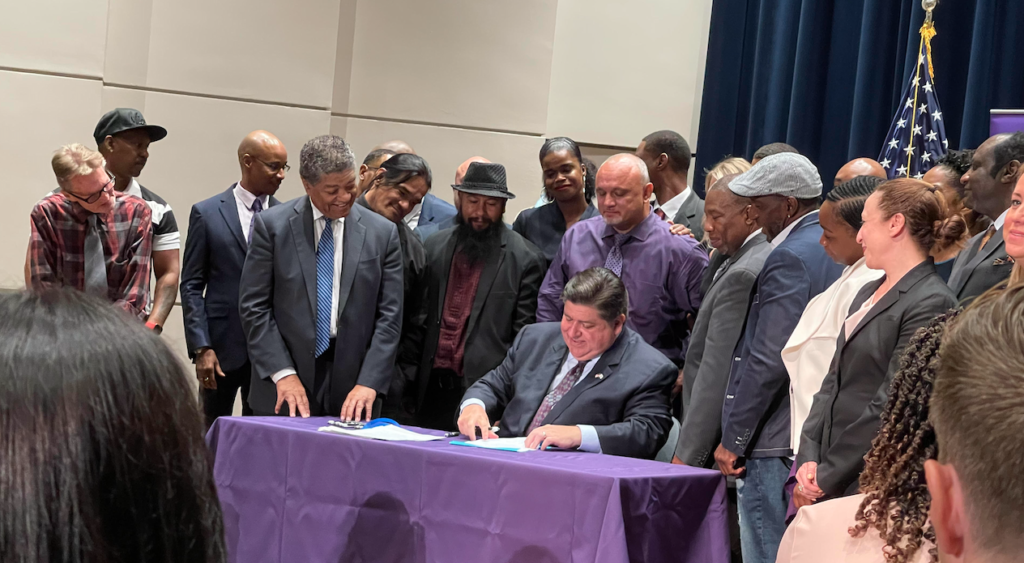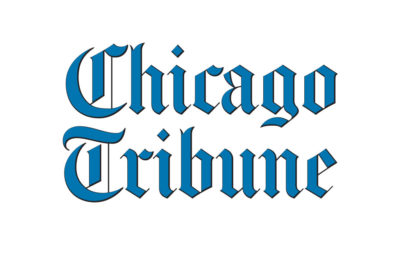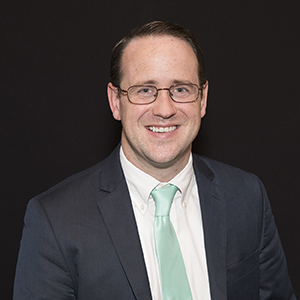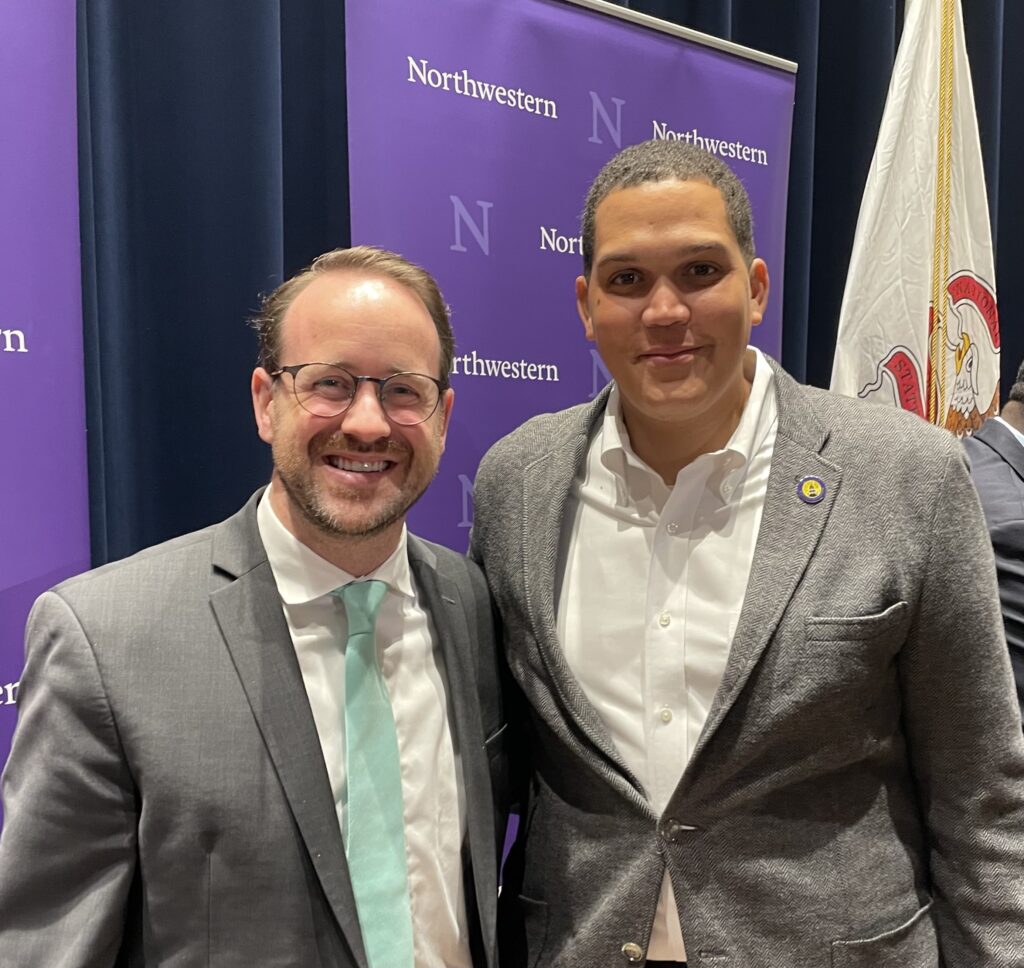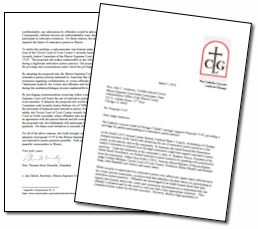
The Catholic Lawyers Guild’s Restorative Justice Project had its inception in a suggestion from Cardinal Blase J. Cupich. Not long after he arrived in Chicago, in February of 2015 Cardinal Cupich came to the Guild’s annual Day of Recollection to celebrate Mass and join in discussion with members of the Guild. In the course of that conversation, he urged the Guild to provide assistance to the Precious Blood Ministry of Reconciliation in the Back of the Yards neighborhood of Chicago. Founded by members of the Precious Blood religious community, this Ministry sought to serve “as agents of reconciliation and healing with those in our community and our Church who have been impacted by violence and conflict.” Under the leadership of Father David Kelly, the Ministry utilized “Peace Circles” to bring together victims and those accused of crime to engage in dialogue. This process was part of a growing national movement known as the Restorative Justice Project.
In the summer of 2015, Matthew Simon, then President of the Guild, the Guild’s two vice-presidents, Judge Tom Donnelly and Dan Murray, and several other members of the Guild visited the Precious Blood Center. They were overwhelmed by the wonderful work that the Center was doing in providing healing to a community plagued by too much violence. Thereupon, the Executive Committee of the Guild decided to form a new committee of the Guild, the Restorative Justice Committee, on which Matthew Simon, Tom Donnelly and Dan Murray agreed to serve, to emphasize the importance this committee’s work would occupy for the Guild.
The Restorative Justice Committee quickly considered how it could best play a supportive role on behalf of the Center. Early on, the Committee learned that a major obstacle to honest and effective dialogue within the Peace Circles was the not unexpected fear of defense counsel that their clients, in the course of dialogue within the Peace Circle, would make admissions that could be used against them in court proceedings. So the Committee took upon itself the task of drafting a rule providing an evidentiary privilege for communications made in the course of these Peace Circles. A subcommittee was formed, including a religiously diverse group of judges and lawyers, under the leadership of Judge Stuart Katz, to prepare the text of a proposed legislation.
On January 28, 2020, Rep. Will Guzzardi. (D-Chicago) 39th District introduced HB 4295 Privilege For Restorative Justice Practices in the Illinois House of Representatives. On July 20, 2020, the Secretary of the Illinois Legislative Black Caucus, Representative Carol Ammons (D-Champaign) 103rd District, stepped up to become the chief sponsor. Momentum continues to build.
On Thursday, July 15, 2021, Governor Pritzker signed into law S.B. 64, which creates a privilege for statements made in restorative justice circles. S.B. 64 is the product of years of dedication by many members of the Catholic Lawyers Guild of Chicago, among others. In February 2015, Cardinal Cupich called on the CLG to promote restorative justice practices in the Chicago community. Restorative justice practices are gatherings in which parties who have caused harm, parties who have been harmed, and community stakeholders come together to identify and repair harm, address trauma, reduce the likelihood of further harm, and work to strengthen community ties.
Several members of the Guild visited the Precious Blood Ministry of Reconciliation, a restorative justice hub in the Back of the Yards neighborhood, and were overwhelmed by its work promoting healing, reconciliation, and forgiveness in a community plagued by too much violence. But the Guild learned of a major obstacle to open and effective dialogue: lawyers representing individuals who wished to participate in restorative justice circles were concerned that statements their clients made in such circles might later be used against them in court proceedings. So, the Guild’s new Restorative Justice Committee, led by former Guild President Matthew Simon, drafted a new rule that would provide an evidentiary privilege for communications made in such restorative justice circles. Over the past six years, Simon, Judge Tom Donnelly, and so many others on the Committee worked tirelessly to make this rule the law in Illinois.
Simon and the CLG’s current President, Judge Ed Washington, were present for the signing. We are grateful to all those who supported our effort, and hopeful that this new law helps bring about healing, reconciliation, and ultimately, a safer and more compassionate community.
Restorative Justice Blog & News
July 2023
Chicago Tribune highlights positive results of Cook County Restorative Justice Program
By Matthew Simon
President of the Helen Brach Foundation,
Chair of CLG Restorative Justice Committee
Since Judge Thomas Donnelly invited Fr. David Kelly, Executive Director of the Precious Blood Ministry of Reconciliation to address our Board about eight years ago, the Guild has taken a keen interest in supporting Fr. Kelly’s efforts to promote the use of Restorative Justice (RJ) principles and practices to promote healing and reconciliation within our communities.
Two years ago, in order to promote the more widespread use of RJ practices such as peace circles, the Guild – with the support of a broad coalition of community organizations and the active support of Judge Timothy Evans, Chief Judge of Cook County Circuit Court – persuaded the Illinois General Assembly to adopt a bill –which Governor Pritzker later signed into law – that provides that anything that a participant might say in a RJ practice will be deemed to be a privileged communication that may not be used against the participant in any subsequent civil, criminal or administrative proceeding.
Six years ago, Judge Evans opened the first Restorative Justice Community Court (RJCC) in Cook County in the North Lawndale community of the City of Chicago. Judge Colleen Sheehan was the first judge to preside over this Court. Upon her retirement, Judge Patricia Spratt assumed this role. Recently, Judge Evans opened two more RJCCs – one in the Englewood Community and one in the Avondale community of the City of Chicago.
This past Sunday, July 23, 2023, the Chicago Tribune ran a front page article that described how RJCCs operate and noted how successful they have been. The author of the article cited a Cook County Court study that found that the participants in this program (the RJCCs) had a 13% recidivism rate compared to a 65% recidivism rate for a peer group of defendants with similar profiles against whom similar charges had been brought in the County’s traditional criminal courts. In this article, Judge Evans is quoted as saying that he would like to expand the number of RJCCs to “as many communities as would welcome us.”
You may read the entire article by clicking on this link.
We hope that many more communities across our City and State will embrace RJ principles and practices including the use of RJCCs. The Guild will continue to promote the use of RJ principles and practices in a variety of settings including our schools, parishes, workplaces and neighborhoods.
JULY 2021
New Illinois Law Boldly Safeguards and Promotes Restorative Justice Practices
By Patrick Keenan-Devlin
Executive Director of the James B. Moran Center for Youth Advocacy
On July 15th, 2021, Illinois Governor J.B. Pritzker signed Senate Bill 64 into law. The new law, championed by State Senator Robert Peters and State Representative Carol Ammons, historically throws off the chill of self-incrimination as a disincentive for authentic participation in a restorative justice practice.
On July 15th, 2021, Illinois Governor J.B. Pritzker signed Senate Bill 64 into law. The new law, championed by State Senator Robert Peters and State Representative Carol Ammons, historically throws off the chill of self-incrimination as a disincentive for authentic participation in a restorative justice practice.
The genesis of this groundbreaking legislation began six years ago, in February of 2015, in remarks delivered by Cardinal Blase Cupich at a Lenten Day of Recollection for Lawyers sponsored by the Catholic Lawyers Guild of Chicago (the “Guild”). Inspired by the transformative healing work being done by Father Dave Kelly at the Precious Blood Ministry of Reconciliation, Cardinal Cupich called on the bar and judiciary to promote restorative justice practices – an ancient practice that invites community members who cause harm or who have been harmed to identify and repair harm as well as to strengthen community ties by addressing the needs and obligations of all members. In response to Cardinal Cupich’s call, Guild leaders Matthew Simon, Judge Thomas More Donnelly, and Dan Murray formed the “Restorative Justice Committee”. This committee of deeply experienced restorative justice practitioners, including Professors Sheila Murphy and Michael Seng of UIC John Marshall Law School’s Restorative Justice Project, has since then worked to discern what role the law and lawyers could and should play in promoting restorative justice practices.
Gratefully, former President/CEO of the Juvenile Justice Initiative Elizabeth Clarke invited me to attend one of the initial meetings of the Guild’s Restorative Justice Committee. With exasperation in his voice, Judge Stuart Katz of the Circuit Court of Cook County’s Juvenile Justice Division kicked off the discussion by saying something to effect of, “I started a restorative justice program in my courtroom several years ago and it seemed as if at every turn, the Public Defenders thwarted its effectiveness. They refused to allow their clients to participate, out of fear that their clients might incriminate themselves…”
As a juvenile defense attorney, I recall sitting across the table from Judge Katz thinking, “I wouldn’t allow my clients to participate in a restorative justice practice either. It’s too risky… What if they admitted to the crime in question or some other crime for that matter?”
Judge Katz read my mind though. Without missing a beat, Judge Katz proposed, “If we want to foster restorative justice practices, we have to bring along the defense bar… We must somehow shield what offenders say during a restorative justice practice from being used against them in later criminal proceedings.”
For months following that initial meeting, the Committee painstakingly labored on a draft of an evidentiary rule that would eventually serve as the template for Senate Bill 64. Senate Bill 64 confers an evidentiary privilege protecting participants in a restorative justice practice for what is said and done during, as well as in preparation for and as a follow-up to a restorative justice practice, like the privilege afforded between doctors and patients, clergy and congregants, attorneys and clients.
Following six years of inspiring teamwork by advocates, including the Juvenile Justice Initiative and Chicago Alliance Against Sexual Exploitation, as well as Cook County Chief Judge Timothy C. Evans, Illinois has boldly bucked the trend set by other jurisdictions that have foregone or limited privilege and/or confidentiality protections for restorative justice practices and programs. Critically, Senate Bill 64 broadly applies privilege to all restorative justice practices – practices convened in schoolyards, on street corners, and, yes, in courthouses. It’s pioneering!
As the new law states, the hope is that “residents of this State [will] employ restorative justice practices, not only in justiciable matters but in all aspects of life and law.” That’s the goal – to widely seed restorative justice everywhere and in doing so to radically transform systems and communities. The work is far from done, however. The Guild stands ready to vigorously promote the use of restorative justice practices in our courts, schools, and communities. And now, thankfully, the law is on our side.
Learn about SB 64 Statute:
History of the Bill
HB 4295 – Privelege for Restorative Justice Practices
Sponsors: Rep. Carol Ammons, Rep. Will Guzzardi
What the Bill Does:
Removing barriers to participation in Restorative Justice practices by establishing a limited privilege, similar to that used in mediation, to make communications inadmissible in later court proceedings.
The Issue:
- Restorative Justice practices bring together parties who have caused harm and been harmed, along with community stakeholders to strengthen communities by addressing trauma and repairing harm.
- Restorative Justice is increasingly being used in schools, communities, and by the courts, including the Restorative Justice Community Courts in Cook County. It’s also possible for Restorative Justice practitioners to continue running circles via video conference technology and some organizations have released guidelines for how to do so safely.
- For a restorative justice proceeding to be successful, parties must engage in open and honest dialogue, revealing sensitive information. The risk of disclosing information that could later be used against a participant in court is a barrier to participation for many people who could benefit from restorative justice.
Why This Bill Is Necessary:
- This bill will make things said or done in a restorative justice practice confidential and inadmissible in later court proceedings. Similar to the attorney-client privilege, disclosure is allowed when necessary to prevent harm or a crime, and for mandated reporters.
- Judges would ultimately provide oversight to ensure the legitimacy of a restorative justice practice – ensuring that the practice is not used for coercive or prohibited purposes.
- The proposal is similar to current confidentiality protections in mediation proceedings.
- By ensuring that participants will not be penalized in court for participating in restorative justice practices, this bill will encourage the expanded use of restorative justice and allow Illinois to continue to be a leader in restorative justice.
- Evidence that is otherwise admissible in court or subject to discovery would not become inadmissible solely because it was discussed in a restorative justice practice.
- Participants of a restorative justice practice would not be prevented from disclosing information learned in a practice to law enforcement. This only limits the State from using things said or done by an individual in preparation for, during, or as a follow-up to a restorative justice practice as evidence.
Supporters Include:
Individual Supporters
Cook County Board President, Toni Preckwinkle
Cook County Sheriff, Tom Dart
Sister Cathy Ryan, Maryville Academy
Fr. Larry Dowling, St. Agatha’s Church, Chicago
Bar Associations/Legal Orgs
Illinois State Bar Association
Cook County Bar Association
Chicago Bar Association
Law Office of the Cook County Public Defender
Catholic Lawyers Guild of Chicago
Illinois Association of Criminal Defense Lawyers
John Marshall Law School Restorative Justice Project
Adler University
Institute for Public Safety and Social Justice
Advocacy Organizations
Catholic Conference of Illinois
Catholic Theological Union
Chicago Coalition for the Homeless
Chicago Urban League
Juvenile Justice Initiative
Restore Justice
League of Women Voters of Illinois
Illinois Justice Project
Illinois Coalition Against Sexual Assault
Chicago Alliance Against Sexual Exploitation
Illinois Parent Teacher Association
Chicago Votes
Mother’s Against Wrongful Convictions
Service Providers
YMCA of Illinois
Treatment Alternatives for Safe Communities
The James B. Moran Center for Youth Advocacy (Evanston)
Community Renewal Society (Chicago)
Restorative Justice Practitioners
Lawndale Christian Legal Center (Chicago)
ALSO-Chicago (Humboldt Park, Chicago)
Target Area DevCorp (Auburn Gresham, Chicago)
BUILD Chicago (West Garfield Park, Chicago)
Community Renewal Society (Chicago)
Kenwood-Oakland Community Organization (Chicago)
New Life Centers of Chicagoland (Chicago)
Nehemian Trinity Rising (Beverly, Chicago)
Illinois Balanced and Restorative Justice (Champaign, IL
The Center for Empowerment and Justice (Carbondale)
Precious Blood Ministry of Reconciliation (Back of the Yards, Chicago)
Prevent School Violence (Chicago)
Conflict 180
Restorative Justice Programs
Additionally, the Guild’s Restorative Justice Committee has turned its attention to establishing Restorative Justice programs on a pilot basis in several inner-city Catholic schools near the Precious Blood Center in the Back of the Yards. With the assistance of Father Dave Kelly of the Precious Blood Ministry and a Chicago Bar Association Committee chaired by retired Judges Tom Hogan and Sheila Murphy, these programs are now up and running in two nearby schools, St. Leo High School and St. Sabina Elementary School, and is soon to start in a third neighborhood Catholic school. Preliminary results are highly encouraging.
The Guild’s Restorative Justice Committee has become a signature initiative of the Guild as part of the broader work of the Church to counter conflict and violence in our community with dialogue and love.

